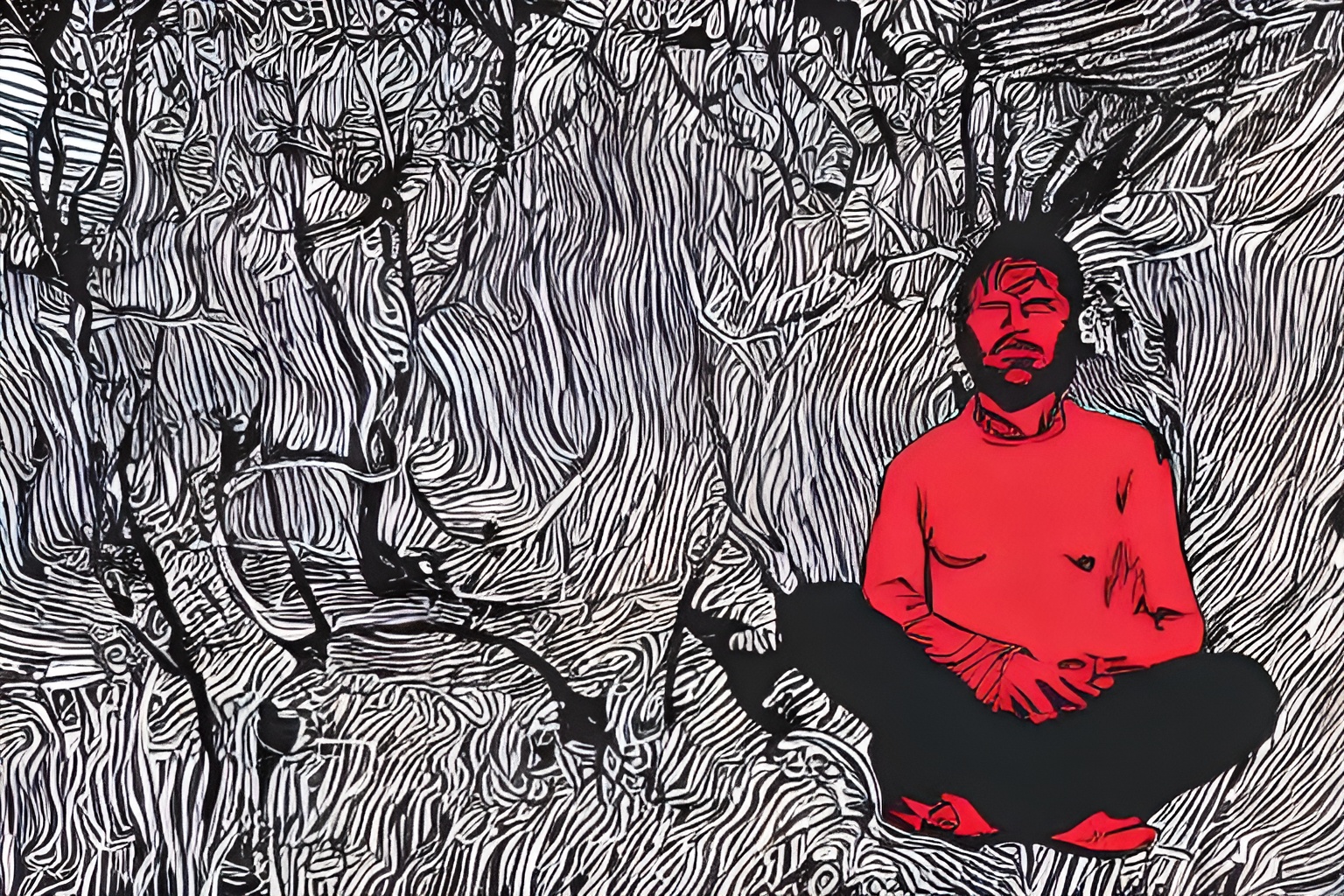The Psychology of Being Happier Alone
Published by Ben Worrall 23rd March 2024

There’s a stigma attached to spending too much time alone. It’s seen as a sign of a dysfunctional personality.
When we label someone as a loner, we usually envision an unhealthy individual lurking in the darkness of a basement or a deranged sociopath stalking moonlit streets.
But to equate all solitary people with these stereotypes misses the big-picture advantages of an isolated lifestyle.
If we look closer, it becomes clear that the deepest happiness is often found in our own company.
What is Loneliness?
We depend on our parents when we are young and then on institutions and collective narratives as we become contributing members of society.
We’re undeniably linked to those around us. The actions of others directly affect us and vice versa. Whether we like it or not, we exist as part of a larger system, and it’s our interdependent relationship with this system that determines our destiny.
It’s no surprise then that the social world is of the utmost importance to us and dictates almost everything we do — from our behaviour, to the clothes we wear, to the values we hold.
But for those who can’t find their place in the social system they were born into, a deep sense of loneliness is bound to emerge. They are indirectly being told by the cultural norms of their time, that who they are — their very essence — is not acceptable.
It’s more than not having friends or anyone to talk to. It’s a rejection of the part by the whole. It’s the experience of not belonging.
Think of society as a puzzle and the lonely individual as a piece that can’t find a place that fits their shape. The puzzle hasn’t been designed for them. It has been designed by the collective forces of previous generations which has resulted in an arbitrary structure. There’s no guarantee that the individual’s personality, strengths, values, and inclinations match up with it at all.
Therefore many of us attempt to change our natural shape to make ourselves fit. We squeeze ourselves into the nearest hole and pretend we belong. We hope that by ironing ourselves into the empty cracks, the fear and despair of exclusion will simmer down.
But this is an artificial solution. Deep within we know we’re faking it. Despite our best intentions, the part of ourselves we’re trying to make fit in is still being rejected by the whole.
We try our best to push this feeling of inauthenticity down, but it’s always lurking in the background. This is why we experience loneliness even when our lives are full of interactions and activities. It’s why large cities are some of the loneliest places of all.
But what other choice do we have?
We either pretend to fit in or embrace our rejection. Neither option is particularly desirable. And it’s this dilemma that influences today’s undercurrent of loneliness.
Loneliness And Fear
Fear accompanies loneliness. There’s an insecurity and vulnerability to it. Experiencing ourselves as separate from the whole is perceived as dangerous. It threatens our survival.
Most people will do whatever it takes to avoid this sickening feeling of unease. They cling to the familiar, devote themselves to routine, jab their hooks into any social relation available, and hold on for dear life.
Being alone forces us to face ourselves. When we’re constantly surrounded by others we can more easily escape our self-doubts, insecurities, flaws, and the nagging existential mysteries of life. Being alone is difficult because we don’t want to experience these emotionally challenging realities.
Social Pressures
Extensive social pressure doubles down on the experience of loneliness. We’ve been conditioned to view being alone as a negative. A certain level of social judgement accompanies this conditioning, both from ourselves and others. We tend to view being alone as a personal failure, even temporarily, like eating alone at a restaurant.
These expectations heighten the experience of loneliness and make it even more difficult to embrace being alone. Instead, it seems to come with a great deal of baggage and it’s this socially created weight that drags us down into the pits of despair.
Embracing Loneliness
Is it possible that the cries from our culture encouraging social integration above all else have led us off course?
What if attempting to artificially fit ourselves into society’s puzzle won’t provide the fulfilment we tend to assume it will?
The social world has its appeal and it’s understandable why we strive to find our place in it. But relying on it as your sole source of meaning and satisfaction is a mistake. One that can limit your potential for living a truly unique and inspiring life.
I want to explore the possibility that embracing loneliness, at least for a time, could be exactly what many of us need to get in touch with the highest version of ourselves. Ultimately, revealing a fundamental relationship with life that exists just below the surface of our socially constructed systems.
The Benefits of Being Alone
“Isolation is the gift. All the others are a test of your endurance.” — Charles Bukowski
Spending time alone can offer a range of unexpected benefits not easily found in the social world. Not only can practical opportunities emerge, but a sense of impregnable well-being arises over time.
Autonomy
Being alone gives you more control over your decisions and your use of time. Having autonomy is crucial for navigating the challenges of early life and making wise long-term choices.
It’s vital for young people to separate themselves from the herd and become independent thinkers outside the rigid clutches of groupthink.
Speaking personally, autonomy is one of the most important aspects of my life. Spending time alone has increased my ability to make unconventional decisions, pivot when required, and ultimately dictate my course.
If I hadn’t viewed autonomy as important in my younger years, there’s no way I’d have developed the understanding or independent work ethic that allows me to write these essays.
Simplification
Modern life is full of distractions.
Most of us are constantly overwhelmed. There’s too much to do, see, buy, and experience. And not nearly enough time in the day to do it all.
Spending time alone allows you to simplify your everyday routine. By removing social obligations from your schedule you give yourself room to breathe again.
Dusting away all the physical and mental clutter that has been haunting you will completely change your day-to-day experience. It provides a great deal of peace of mind, and at the end of the day, much of what we’re searching for is peace of mind.
But this minimalist approach can easily be disrupted by inviting the wrong people into your life. Reserve your rights to exist on your own terms. Never compromise your values for the sake of the social world.
Productivity
Living a life of autonomy and simplicity allows you to be productive in whatever way is most meaningful to you.
If you’re an ambitious person with a vision you want to bring to life then being able to find time and space to be consistently productive is vital.
It’s those who find the solitude to do their work who are most likely to succeed in the long term and make a real positive impact on the world.
Needing to fill your life with social events and half-hearted relationships is naturally going to suck your time and leave your energy levels dilapidated.
Creativity
Many of the great artists, inventors, and thinkers of the past have valued their solitude.
To connect authentically with the depths of reality and retrieve the creative goodies that simmer below the surface requires isolation. You need to give yourself the time and space to dream.
The perfect creative environment is only available when sought out. The average lifestyle doesn’t provide this. So if you’re a creative individual, think twice about giving your power away in the pursuit of social norms.
Personal Growth
Navigating life alone puts you into a sink-or-swim situation. Are you going to conquer the challenges that are thrown at you? Or are you going to hide in the crevices of a socially constructed world?
The fastest growth happens at times when you’re forced to step up and face reality head-on. There’s no hiding. There’s no running away. You’re responsible, and by accepting this responsibility you become more resourceful in your approach.
The individual journey also allows you to turn inwards and reflect on the type of person you are, your strengths, weaknesses, and what you truly want. You naturally begin the process of introspection.
Living abroad and travelling alone has been one of the best decisions I’ve made for my personal growth. It forced me to rely on my own capabilities. It also allowed me to disengage from the mental chains of my birth culture.
People don’t realise the extent to which they are influenced by the social constructs of their own culture. You only begin to see this clearly when you have gained extensive distance over a long period. If you haven’t explored different viewpoints and alternate ways of life, you will see the cultural lock in other people but fail to see the extent to which it controls your own life.
A Love of Reality
By spending time alone you open yourself up to developing a more truthful relationship with reality.
Why do we consider relationships necessary for love to blossom?
Those who have developed the deepest love for life are happiest alone. This is why highly spiritual individuals have sought to isolate themselves in caves or on mountaintops. It’s the isolation that allows them to fully appreciate reality for what it is.
Maybe you’ve experienced this as the deep connection you feel when in nature or gazing at the stars. There’s an inherent truth in the relationship between man and his natural environment. One that becomes distorted when surrounded by people.
Developing a solo appreciation of reality is subtle and may require mental training. But if you’re brave enough to embrace distractionless solitude, you may find that an almost mystical appreciation for the beauty of life emerges. You glimpse the essence of reality in its totality.
An Existential View
Life is a solo journey.
As vital as relationships are for a life well-lived, they will always be secondary to our first-hand experience, no matter how hard we try to place them at the centre.
At the end of the day, we’re all born alone and we die alone. The joy and the sorrow, the ups and the downs, they’re your birthright and your burden to bear.
The only experience you have ever had, or will ever have, is your own. There is no way to experience life through the eyes of another. Your experience is unique, never to be repeated. So why not learn to love yourself and your unique perspective? Why not get to know yourself like you would a new friend?
The last thing I’ll say is that while our consciousnesses may be cut off, alone, and eternally misunderstood, there’s also an understanding deep down within us that intuits that we’re never really alone.
It’s the all-knowing, all-seeing eye, that watches the events of your life play out without attachment. It’s the higher self, which reacts to events of the world, both good and bad, with a wink and a smile.
Ben Worrall





